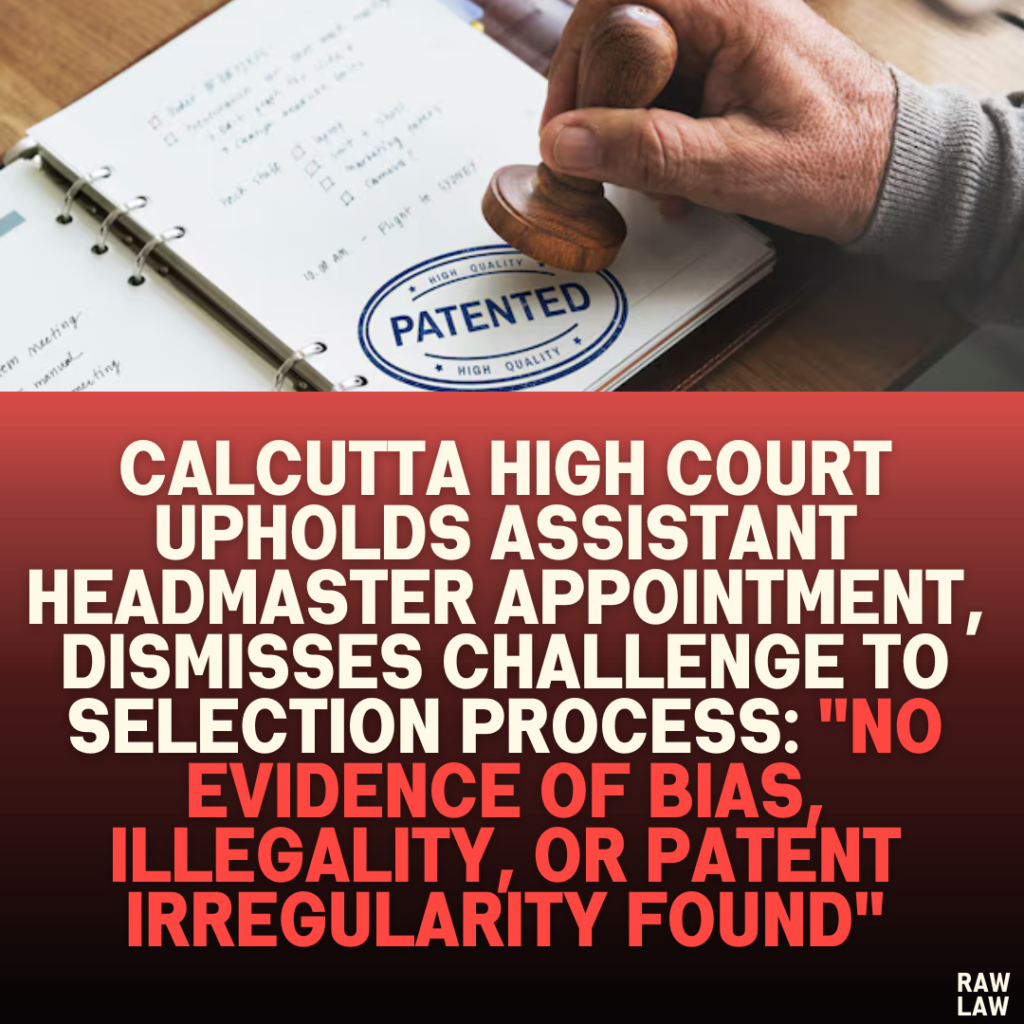Court’s Decision: The Calcutta High Court dismissed the writ petition challenging the recruitment process for the Assistant Headmaster at Raghunathbari Ramtarak High School, concluding there was no basis to interfere with the decision of the selection committee. The court found no “illegality or patent material irregularity” in the construction or actions of the committee that would justify judicial intervention. The petitioner’s plea to recast the selection panel based solely on marks awarded by certain committee members was deemed unsustainable.
Facts: The petitioner, an Assistant Teacher and candidate for the Assistant Headmaster position, contested the process, arguing that the selection committee’s evaluation was biased and flawed. She claimed that two members of the committee—namely the panchayat nominee and the teacher’s representative—had acted in a prejudiced manner, awarding her lower marks than other committee members did. Additionally, she challenged the constitution of the committee, asserting that the teacher’s representative was not appointed as per the rules outlined in Memo No. 1628.
Issues:
- Whether the selection committee’s process and constitution adhered to the guidelines under Memo No. 1628.
- Whether the alleged bias of two committee members affected the fairness of the selection process.
- Whether the petitioner could seek judicial review based on the selection panel’s majority decisions.
Petitioner’s Arguments: The petitioner argued that the process was tainted by bias, as evidenced by the disproportionate marks awarded by the panchayat nominee and teacher’s representative. She alleged that these members intentionally lowered her score to prevent her selection. The petitioner also claimed that the committee’s composition was irregular, as the teacher’s representative was elected by teachers rather than selected by the managing committee, violating Memo No. 1628.
Respondent’s Arguments: The respondents, including the school authority and the newly appointed Assistant Headmaster, defended the committee’s actions, asserting that the process was transparent and objective. They argued that the petitioner, having participated in the process without objection, could not later challenge its legitimacy. They further contended that any deviation in appointing the teacher’s representative was non-prejudicial and did not vitiate the selection process.
Analysis of the Law: The court examined Memo No. 1628, which governs the constitution of the selection committee, and concluded that the process used to appoint the teacher’s representative—while differing from the specified method—did not breach any mandatory legal requirement. The court emphasized that the petitioner’s acceptance of the process by participating in it barred her from later disputing the committee’s composition.
Precedent Analysis: The court referred to Ashok Kumar Yadav & Others vs. State of Haryana & Others, which underscored the importance of fairness in selection processes. Additionally, it cited Dalpat Abasaheb Solunke & Others vs. Dr. B.S. Mahajan & Others, affirming that judicial interference in selection matters is warranted only in cases of evident illegality, bias, or procedural irregularity.
Court’s Reasoning: The court reasoned that without clear evidence of malafide actions or gross irregularity in the selection process, it could not overturn the committee’s decisions. Mere dissatisfaction with the marks awarded by specific members did not suffice to prove bias. Additionally, the petitioner’s request to form a new panel based on a majority decision was deemed inadmissible, as Memo No. 1628 does not support such selective adjudication of marks.
Conclusion: The court found no basis to interfere with the selection committee’s decision, as there was no substantial evidence of bias or procedural violations. The petition was dismissed, upholding the committee’s authority in assessing candidate qualifications.
Implications: The ruling reinforces the autonomy of selection committees in recruitment matters and sets a precedent for limited judicial interference unless clear evidence of malfeasance or procedural flaws is demonstrated. The judgment emphasizes that candidates participating in a selection process cannot later challenge its legitimacy without compelling reasons.




Pingback: Kerala High Court Upholds Civil Court's Authority Over Waqf Tribunal in Executing Pre-Tribunal Decrees: "Decree Cannot Lose Enforceability Due to Subsequent Jurisdictional Changes" and Orders Expedited Execution - Raw Law